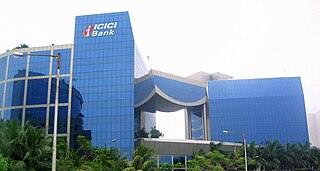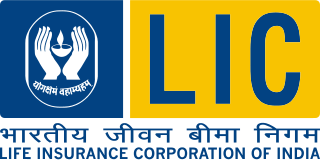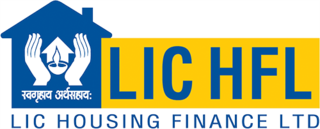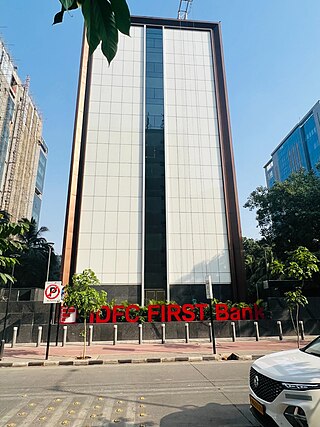
State Bank of India (SBI) is an Indian multinational public sector bank and financial services statutory body headquartered in Mumbai, Maharashtra. SBI is the 45th largest bank in the world by total assets and ranked 221st in the Fortune Global 500 list of the world's biggest corporations of 2020, being the only Indian bank on the list. It is a public sector bank and the largest bank in India with a 23% market share by assets and a 25% share of the total loan and deposits market. It is also the tenth largest employer in India with nearly 250,000 employees. In 2023, the company’s seat in Forbes Global 2000 was 77.

ICICI Bank Limited is an Indian multinational bank and financial services company headquartered in Mumbai with a registered office in Vadodara. It offers a wide range of banking and financial services for corporate and retail customers through various delivery channels and specialized subsidiaries in the areas of investment banking, life, non-life insurance, venture capital and asset management.
Housing Development Finance Corporation was an Indian private sector mortgage lender based in Mumbai. It was the biggest housing finance company in India. It also had a presence in banking, life and general insurance, asset management, venture capital and deposits through its associate and subsidiary companies.

Reliance Capital Limited is an Indian diversified financial services holding company promoted by Reliance Anil Dhirubhai Ambani Group. Reliance Capital, a constituent of Nifty Midcap 50 and MSCI Global Small Cap Index, is a part of the Reliance Group. It is amongst India's leading and most valuable financial services companies in the private sector. As on 31 March 2017, the net worth of the company stood at ₹16,548 crore, while its total assets as on the date stood at ₹82,209 crore. In Fortune India 500 list of 2018, Reliance Capital was ranked as the 77th largest corporation in India with 5th rank in 'Non-Banking Finance' category.

Life Insurance Corporation of India (LIC) is an Indian multinational public sector life insurance company headquartered in Mumbai. It is India's largest insurance company as well as the largest institutional investor with total assets under management worth ₹49.24 trillion (US$620 billion) as of March 2023. It is under the ownership of Government of India and administrative control of the Ministry of Finance.

Small Industries Development Bank of India (SIDBI) is the apex regulatory body for overall licensing and regulation of micro, small and medium enterprise finance companies in India. It is under the jurisdiction of Ministry of Finance, Government of India headquartered at Lucknow and having its offices all over the country.The SIDBI was established on April 2, 1990, by Government of India, as a wholly owned subsidiary of IDBI Bank. It was delinked from IDBI w.e.f. March 27, 2000. Its purpose is to provide refinance facilities to banks and financial institutions and engage in term lending and working capital finance to industries, and serves as the principal financial institution in the Micro, Small and Medium Enterprises (MSME) sector. SIDBI also coordinates the functions of institutions engaged in similar activities. It was established in 1990, through an Act of Parliament.

The Ministry of Finance is a ministry within the Government of India concerned with the economy of India, serving as the Treasury of India. In particular, it concerns itself with taxation, financial legislation, financial institutions, capital markets, centre and state finances, and the Union Budget.
Axis Bank Limited, formerly known as UTI Bank (1993–2007), is an Indian multinational banking and financial services company headquartered in Mumbai, Maharashtra. It is India's third largest private sector bank by assets and fourth largest by market capitalisation. It sells financial services to large and mid-size companies, SMEs and retail businesses.
A prevailing trend from the medieval period, most Indians invest more than half of personal savings physical assets such as land, houses, gold, livestock, and other precious metals and ornaments.

Infrastructure Leasing & Financial Services Limited (IL&FS) is an Indian state-funded infrastructure development and finance company. It was created by public sector banks and insurance companies.
All India Financial Institutions (AIFI) is a group composed of financial regulatory bodies that play a pivotal role in the financial markets. Also known as "financial instruments", the financial institutions assist in the proper allocation of resources, sourcing from businesses that have a surplus and distributing to others who have deficits - this also assists with ensuring the continued circulation of money in the economy. Possibly of greatest significance, the financial institutions act as an intermediary between borrowers and final lenders, providing safety and liquidity. This process subsequently ensures earnings on the investments and savings involved. In Post-Independence India, people were encouraged to increase savings, a tactic intended to provide funds for investment by the Indian government. However, there was a huge gap between the supply of savings and demand for the investment opportunities in the country.
Religare Enterprises Limited (REL) is an Indian investment and financial services holding company, headquartered in New Delhi. REL is listed on National Stock Exchange of India and Bombay Stock Exchange. It is registered with the Reserve Bank of India (RBI).
Public Sector Undertakings (Banks) are a major type of government-owned banks in India, where a majority stake (i.e., more than 50%) is held by the Ministry of Finance (India) of the Government of India or State Ministry of Finance of various State Governments of India. The shares of these government-owned-banks are listed on stock exchanges. Their main objective is social welfare.

LIC Housing Finance Limited is one of the largest Housing Finance Mortgage loan companies in India having its Registered and Corporate office at Mumbai. LIC HFL is a subsidiary company of LIC.
The Insurance Regulatory and Development Authority of India (IRDAI) is an autonomous and statutory body under the jurisdiction of Ministry of Finance, Government of India. It is tasked with regulating and licensing the insurance and re-insurance industries in India. It was constituted by the Insurance Regulatory and Development Authority Act, 1999, an Act of Parliament passed by the Government of India. The agency's headquarters are in Hyderabad, Telangana, where it moved from Delhi in 2001.

HDFC Life Insurance Company Limited is a long-term life insurance provider headquartered in Mumbai, offering individual and group insurance services. The company was incorporated on 14 August 2000.
Public Sector Undertakings (PSU) or Public Sector Enterprises (PSE) in India are government-owned enterprises in which 51 percent or more share capital is held by the Government of India or state governments or joint ventures between multiple Public Sector Enterprises. Depending on the level of government ownership, they can be broadly categorised as Central PSUs or State PSUs. These entities include government companies, statutory corporations, banking institutions, and departmentally run companies. PSUs are officially classified into three categories, which are Central Public Sector Enterprises (CPSE) and Public Sector Banks (PSB) owned by the central government or other CPSEs/PSBs, and State Level Public Enterprises (SLPE) owned by state governments or other SLPEs. CPSE is further classified into Strategic Sector and Non-Strategic Sector. Depending on their financial performance and progress, CPSEs are granted the status of Maharatna, Navaratna, and Miniratna.
Bandhan Bank Ltd. is a banking and financial services company, headquartered in Kolkata. Bandhan Bank is present in 35 out of 36 states and union territories of India, with 6,250 banking outlets and 3.26 crore customers. Having received the universal banking licence from the Reserve Bank of India, Bandhan Bank started operations on August 23, 2015, with 501 branches, 50 ATMs and 2,022 Banking Units (BUs). The Bank has mobilised deposits of ₹1,17,422 crore and its total advances stand at ₹1,15,940 crore as of December 31, 2023.
Dr. Sailendra Narain is a development finance specialist born in Nawadah, Bihar Province, India. For over 40 years, Narain has been a pioneer in developing the global SME sector. His specialities include: designing policy frameworks for SME Growth, establishing SME financing programs in banking and development financial institutions, and capacity building for SMEs with a focus on Entrepreneurship.

IDFC FIRST Bank is an Indian private sector bank formed by the merger of the banking arm of Infrastructure Development Finance Company and Capital First, an Indian non-bank financial institution.











